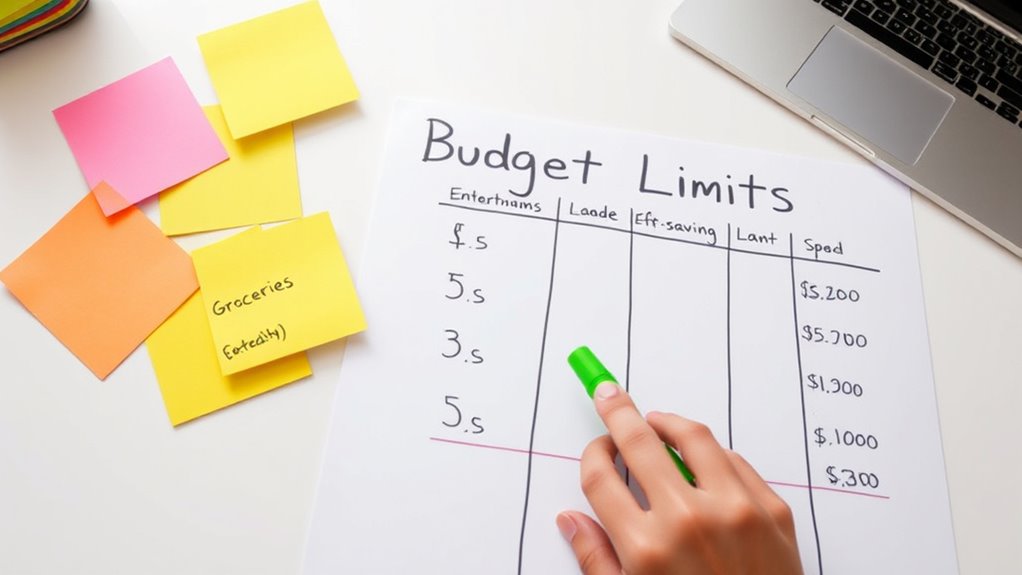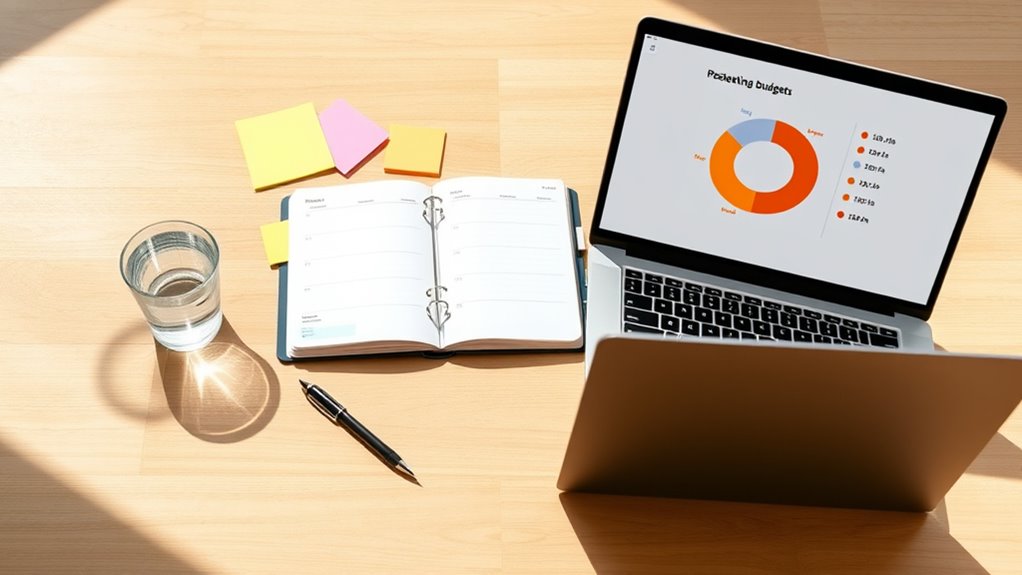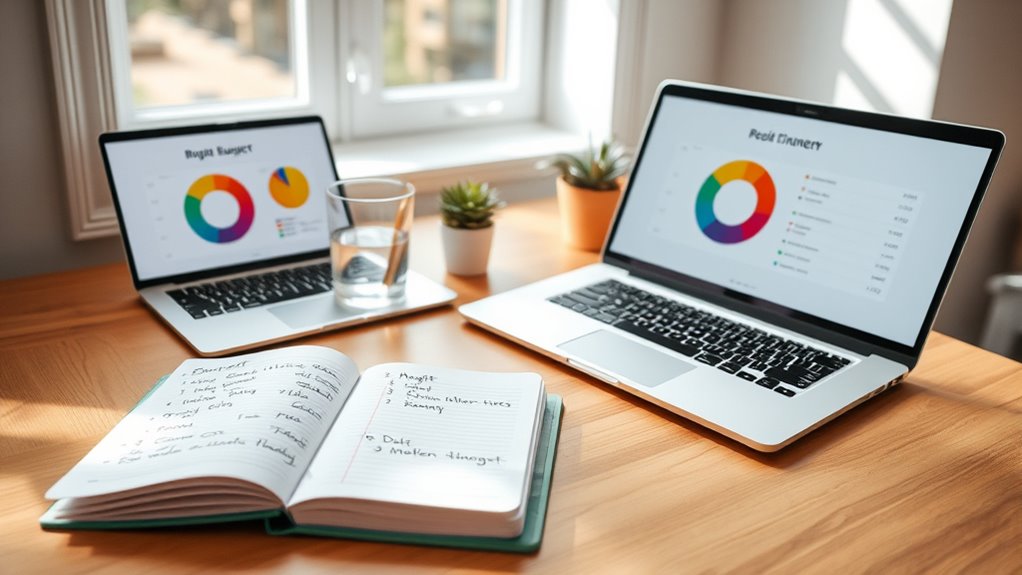To create a simple budget, start by figuring out exactly how much money you make each month. Track every expense, even small purchases, for a full month to see where your money goes. Separate your needs from wants, then set clear spending limits for each category. Make a basic plan, save a little from each paycheck, and review your budget regularly. Keep adjusting it as your situation changes, and you’ll find managing your money easier—more tips await if you look further.
Key Takeaways
- Track all income and expenses to understand your cash flow clearly.
- Set realistic spending limits for each category and stick to them.
- Regularly review and adjust your budget to accommodate changes in income or expenses.
- Keep your budgeting process simple with easy tools like spreadsheets or apps.
- Celebrate small savings milestones to stay motivated and reinforce good financial habits.
Know Exactly How Much Money You Make

To create an effective budget, you need to know exactly how much money you make each month. Start by listing all your income sources, including your salary, freelance work, or any side gigs. Review your pay stubs carefully to understand your salary details, such as base pay, bonuses, and overtime. If your income varies month to month, track it over several months to get an average. Having a clear picture of your total income helps you set realistic spending limits and savings goals. Remember, knowing your exact income is the foundation of a solid budget. Without this clarity, it’s easy to underestimate expenses or overestimate what you can save. Make sure to include all income sources for a thorough view. Understanding your income stability can help you plan more effectively for the future.
Track Every Expense for a Month

Tracking every expense for a month gives you a clear picture of where your money goes. It helps you identify spending patterns across different expense categories like groceries, transportation, and entertainment. Use tracking methods that work best for you, such as a budgeting app, a spreadsheet, or a simple notebook. Log every purchase, no matter how small, to guarantee accuracy. This detailed record reveals habits you might not notice otherwise, like unnecessary subscriptions or overspending on dining out. By monitoring your expenses daily, you gain insight into your financial habits and can spot areas for improvement. Staying consistent with this practice provides a solid foundation for creating a realistic budget and managing your money more effectively. Additionally, understanding potential security vulnerabilities in your payment methods ensures your financial information remains protected throughout your budgeting process.
Separate Needs From Wants

Have you ever wondered how much of your spending really contributes to your overall financial goals? The key is to separate needs from wants. Needs are essentials like rent, groceries, and utilities—things you can’t do without. Wants, on the other hand, include luxury items and non-essential purchases that feel good in the moment. Be honest with yourself about emotional spending, which often leads to buying things to boost your mood rather than fulfill a real necessity. By clearly identifying what’s necessary and what’s optional, you can cut back on unnecessary expenses and prioritize your savings. Implementing simple budgeting tips can further help you stay disciplined and focused on your financial goals. This simple step helps you stay focused on your financial goals and prevents impulse buys from derailing your budget.
Set Clear Spending Limits

Setting clear spending limits is essential to sticking to your budget and achieving your financial goals. When you define specific spending limits, you create clear budget boundaries that prevent overspending. Decide how much you can afford to spend on categories like groceries, entertainment, and dining out each month. Use these limits as a guide, and stick to them consistently. Tracking your expenses helps you stay aware of your spending limits and adjust if needed. Remember, it’s about controlling your money, not restricting yourself unnecessarily. By setting these boundaries early, you gain more control over your finances and avoid surprises at the end of the month. Clear spending limits make it easier to stay disciplined and work toward your financial goals. Implementing budget boundaries helps maintain financial discipline and supports your long-term savings.
Create a Simple Budget Plan

How can you make your budgeting easier and more effective? Start by creating a simple budget plan that fits your lifestyle. Begin with your bank account, tracking all income and expenses to understand your cash flow. Set clear categories for spending, like groceries, rent, and entertainment, and assign limits based on your income. Improving your financial literacy helps you make smarter choices and stay on track. Use your bank statements to monitor your progress regularly. Keep your plan straightforward—avoid overly complicated formulas or confusing numbers. The goal is to make budgeting manageable and realistic. Recognizing the horsepower of electric dirt bikes can help you better plan for associated costs and safety needs. With consistent effort, you’ll gain control over your money, reduce stress, and build a solid foundation for your financial future.
Use Cash or Debit for Daily Spending

Switching from tracking your budget to managing daily spending can make a big difference in controlling your finances. Using cash or debit cards helps you stay aware of your spending in real time. When you pay with cash, you see exactly how much you’re handing over, making it easier to stick to your limits. Debit cards and mobile payments, like digital wallets, offer convenience without overspending, since you’re using your own money directly. Incorporating personal growth resources can also help you develop better financial habits over time. Keep a small cash stash for daily expenses. Use debit cards instead of credit for better control. Opt for mobile payments to track your spending automatically. Set daily or weekly cash limits. Avoid using credit cards for routine purchases.
Save a Little Each Time You Get Paid

Whenever you receive your paycheck, make it a habit to save a small portion right away. Set up automatic transfers to move money into your savings each pay period. This guarantees you save consistently without thinking twice. Building an emergency fund takes time, but saving a little each time adds up quickly. To visualize this, consider the table below: essential oils for savings.
Check Your Budget Regularly

Regularly checking your budget helps you spot spending patterns and stay on track. If you notice expenses creeping up, you can make quick adjustments. Staying proactive guarantees your finances remain aligned with your goals. Being aware of your water usage, such as the costs associated with toilet flushing, can help you identify areas to save.
Monitor Spending Patterns
To keep your budget on track, it’s essential to check your spending patterns often. Regularly reviewing your expenses helps you understand your expense categories and identify habits that may need adjusting. Tracking your spending reveals where your money goes and highlights areas for improvement. You might notice certain categories, like dining out or entertainment, taking up more than they should. Monitoring also helps catch any mistakes or fraud early. Staying aware of your spending habits ensures you stay aligned with your financial goals. Consider these tips:
- Review receipts and bank statements weekly
- Categorize expenses to see where most goes
- Set alerts for large transactions
- Track cash and card spending separately
- Reflect on spending habits monthly to spot trends
- Applying mindful decluttering strategies can help you recognize unnecessary expenses and avoid impulse spending.
Adjust as Needed
Keeping your budget on track requires more than just monitoring your spending; it also means adjusting it as needed. Regularly reviewing your budget helps you stay aligned with your financial goals and adapt to changes in your income or expenses. If you notice you’re overspending in certain areas, consider reallocating funds to support your investment strategies or accelerate debt management. Flexibility is key—life can throw unexpected expenses your way, so tweak your budget to accommodate them without derailing your progress. By checking your budget often, you can identify opportunities to save more or pay off debt faster, ensuring your financial plan remains realistic and effective. Streamline Your Life With Easy Document Management Adjusting as needed keeps your finances healthy and moving toward your long-term objectives.
Adjust Your Budget as Needed

Since your financial situation can change over time, it’s important to review and adjust your budget regularly. Life shifts—like a new job, unexpected expenses, or changes in income—may require updates to stay on track. Modifying your budget helps maintain your emergency funds and keeps your financial flexibility intact. To do this effectively, consider these steps:
- Track your spending to identify areas for adjustment
- Reassess your savings goals periodically
- Increase or decrease allocations based on income changes
- Prioritize building or maintaining emergency funds
- Be flexible and willing to revise your budget as needed
- Incorporate financial planning strategies to adapt to changing circumstances.
Regularly updating your budget ensures you stay in control of your finances and adapt to life’s changes smoothly.
Celebrate Your Financial Progress

Celebrating your financial progress keeps you motivated and focused. By tracking your savings and setting new goals, you can see how far you’ve come. Reward yourself to stay encouraged and continue building good habits. Recognizing your savings milestones can further boost your confidence and commitment.
Track Your Savings
Have you ever wondered how tracking your savings can boost your motivation? By monitoring your progress, you’ll see how small efforts add up, especially through savings challenges or building an emergency fund. Celebrating these milestones keeps you inspired and committed to your financial goals. Empowering riders can benefit from similar tracking methods to stay motivated on their journey toward sustainable transportation choices. Here’s how to make tracking work for you:
- Use a simple spreadsheet or app to log every deposit
- Set mini goals and celebrate each achievement
- Compare your progress monthly to stay motivated
- Visualize your savings growth with charts or graphs
- Recognize your dedication in overcoming savings challenges
Tracking your savings keeps you focused and aware of your progress. It’s a powerful way to stay motivated, especially when working toward building an emergency fund or hitting savings milestones. Celebrate small wins—they lead to big financial success.
Set New Goals
Are you taking time to set new goals after reaching a milestone? Celebrating your financial progress is essential for maintaining motivation. When you hit financial milestones, it’s a perfect opportunity to reevaluate your goals and refine your goal setting strategies. Setting new, achievable targets keeps you focused and driven. Whether you want to save for a big purchase or pay off debt faster, defining clear, measurable objectives helps you stay on track. Remember, each milestone is proof of your progress, so use that momentum to aim higher. Regularly updating your goals ensures they remain relevant and challenging. Celebrating your wins reinforces positive habits, making it easier to stay committed to your financial journey. Leveraging performance metrics can help you track your progress more effectively and adjust your strategies accordingly.
Reward Yourself
Why not acknowledge your achievements along the way? Celebrating your financial progress keeps you motivated and reinforces good habits. Rewarding yourself isn’t about overspending; it’s about practicing self-care and recognizing your efforts. You might treat yourself to leisure activities that boost your well-being, like a movie night or a relaxing walk. Small rewards make your journey enjoyable and sustainable. Consider these ideas:
- Enjoy a favorite snack or coffee
- Book a massage or spa day
- Take a day trip or weekend getaway
- Buy that item you’ve been eyeing
- Spend time on a hobby you love
Celebrating milestones helps you stay focused and positive. Remember, rewarding yourself is an essential part of maintaining your financial discipline and balancing work with leisure. Incorporating small rewards can also improve your overall well-being and make the process more fulfilling.
Frequently Asked Questions
How Do I Stay Motivated to Stick With My Budget?
You can stay motivated to stick with your budget by setting up reward systems for reaching your goals. Celebrate small wins to keep your spirits high. Use visual aids like charts or progress trackers to see your improvements clearly. These tools remind you of your progress and make budgeting more engaging. Keep focusing on your financial goals, and remember that consistency will lead to long-term success.
What Should I Do if I Overspend One Month?
If you overspend one month, don’t panic. Review your expense tracking to identify where you went over budget. Use your emergency fund if necessary, but plan to replenish it soon. Adjust your next month’s budget to prevent future overspending. Stay motivated by reminding yourself of your financial goals, and keep tracking expenses to stay on top of your spending. This proactive approach helps you regain control quickly.
Can Budgeting Help Improve My Credit Score?
Budgeting acts like a compass guiding your financial ship, helping you steer toward a better credit report. When you create and stick to a budget, you prioritize debt repayment, which can boost your credit score over time. By consistently managing your expenses and paying bills on time, you demonstrate responsible financial behavior, ultimately improving your creditworthiness. So yes, budgeting is a powerful tool to enhance your credit score.
How Do I Handle Irregular Income When Budgeting?
To handle irregular income, start by irregular income planning, setting aside extra money during high-earning months. Manage fluctuating earnings by creating a baseline budget based on your lowest income, ensuring essential expenses are covered. Save any surplus from better months to buffer leaner periods. Regularly track your income and expenses, adjusting your budget as needed. This approach helps you stay financially stable despite unpredictable earnings.
What Are Some Common Mistakes to Avoid in Budgeting?
Like Icarus flying too close to the sun, you might overreach with your budget. Avoid neglecting financial literacy and expense tracking, as these are common mistakes. Don’t underestimate your expenses or set unrealistic goals. Failing to monitor your spending regularly can lead to surprises. Keep your budget flexible, prioritize saving, and stay informed. These habits help you avoid pitfalls and build a solid financial foundation.
Conclusion
By following these simple tips, you’ll gain control over your finances. For example, imagine Sarah, who started tracking her expenses and set clear limits. Within months, she saved enough for a small trip. Remember, budgeting isn’t about restrictions—it’s about making smarter choices. Keep checking your progress, tweak your plan when needed, and celebrate your wins. With consistency, you’ll turn your financial goals into reality, just like Sarah did.










